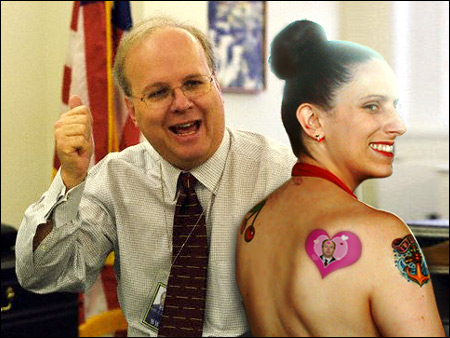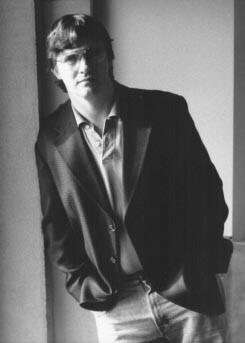Those Hunky, Masculine Warriors
One of the best and most incisive blog writers on the Internet, in my view, is Digby, and this post -- exploring the psychological motives of those belligerent, chest-beating warmongers who adopt the posture and language of a fearless masculine warrior even though they have never actually fought anyone and never would – illustrates why Digby is worth reading every day:
Vietnam, as we were all just mercilessly reminded in the presidential election, was the crucible of the baby boom generation, perhaps the crucible of America as a mature world power.The war provided two very distinct tribal pathways to manhood.
One was to join "the revolution" which included the perk of having equally revolutionary women at their sides, freely joining in sexual as well as political adventure as part of the broader cultural revolution. (The 60's leftist got laid. A lot.) And he was also deeply engaged in the major issue of his age, the war in Vietnam, in a way that was not, at the time, seen as cowardly, but rather quite threatening. His masculine image encompassed both sides of the male archetypal coin --- he was both virile and heroic.
The other pathway to prove your manhood was to test your physical courage in battle. There was an actual bloody fight going on in Vietnam, after all. Plenty of young men volunteered and plenty more were drafted. And despite the fact that it may be illogical on some level to say that if you support a war you must fight it, certainly if your self-image is that of a warrior, tradition requires that you put yourself in the line of fire to prove your courage if the opportunity presents itself.
You simply cannot be a warrior if you are not willing to fight. This, I think, is deeply understood by people at a primitive level and all cultures have some version of it deeply embedded in the DNA. It's not just the willingness to die it also involves the willingness to kill. Men who went to Vietnam and faced their fears of killing and dying, whether voluntarily or involuntarily, put themselves to this test.
And then there were the chickenhawks. They were neither part of the revolution nor did they take the obvious step of volunteering to fight the war they supported. Indeed, due to the draft, they allowed others to fight and die in their place despite the fact that they believed heartily that the best response to communism was to aggressively fight it "over there" so we wouldn't have to fight it here. These were empty boys, unwilling to put themselves on the line at the moment of truth, yet they held the masculine virtues as the highest form of human experience and have portrayed themselves ever since as tough, uncompromising manly men while portraying liberals as weak and effeminate. . . .
The only political aspirants among those three groups who failed to meet the test of their generation were the chickenhawks. And our problem today is that they are the ones in charge of the government as we face a national security threat. These unfulfilled men still have something to prove.
Now, none of this means, at least not for me, that there is something inherently corrupt or improper about supporting a war even if you never fought in one. In fact, I find that line of argument to be inane on its face, which is why I do not like the "chickenhawk" label and reject that argument. A country needs a majority of its population to support a war if it is to win, and the notion that nobody can support a war unless they fought in one is illogical and self-defeating. Roughly 90% of the country supported the war in Afghanistan, obviously including huge numbers of Democrats, ever though only a tiny fraction of that group even served in the military.
Nonetheless, there is no denying that attributes of physical power, aggression, virility, and a willingness to kill or risk one's life when necessary are masculine virtues which every society, including ours, instinctively values. And many men who are unable or unwilling to demonstrate these attributes through their actions -- either due to a lack of physical strength or personal courage -- find it necessary to compensate for this glaring deficiency in their manhood resume. And so they turn to the only thing they are capable of doing to establish some toughness credentials: talking tough, advocating battles that other men fight, striking the pose of a warrior while sitting in their suburban living rooms playing with their infants.
As I said, this does not mean, or even imply, that their views about war and foreign policy are wrong, nor does it mean that they ought to be excluded from participating in debates over these issues. But there is simply no denying that there is something missing inside men like this -- what is missing are the precise masculine-warrior attributes they revere. The contrast between their belligerent, tough guy rhetoric, on the one hand, and their physical awkwardness, their history of avoiding rather than seeking physical conflict and war for themselves, and their unseemly need to establish their own manhood the only way they know how (with risk-free words), on the other hand, is really too glaring not to notice.
Really, all one has to do is take a look at some of the he-men tough guys who shriek about the warrior mindset and showing toughness (while mocking those with different views as weak, soft, effete, and being unwilling to fight), and one immediately sees the visual proof for what Digby says about their psychological motives.
Here are some of America’s great warriors -- the ones who will beat their chests in front of you (from behind the keyboard) and mock those ("liberals") who, unlike them, are weak, mushy girly-men who lack the manly virtues which our warrior-heroes exemplify:
Richard Perle
Fred Barnes
Jonah Goldberg
Paul Mirgenoff, the Powerline Brigade
Karl Rove
Instapundit
Hugh Hewitt

Rush Limbaugh

____________________________
Is it really a great mystery why guys like this have a gaping, unfulfilled need to establish their manliness and warrior credentials through political dialogue, the only route they could find for doing so?
Just listen to the painfully revealing defense which tough-guy Jonah Goldberg gave for the war in Iraq:
Q: If you're a kid and you've had enough of the school bullies pants-ing you in the cafeteria, what's one of the smartest things you can do?A: Punch one of them in the nose as hard as you can and then stand your ground.
Or, in Jonah's case, get someone else to punch one of them in the nose as hard as they can for you, and have them stand their ground for you, while you stay at home in your underwear nurturing your baby daughter and playing computer games. Jonah is candidly telling us -- albeit unintentionally -- why he supports the war: because bullies picked on him, and he needs some way to fight back.
What else is there to know? Just look at them. These guys are the ones who have had sand kicked in their faces their whole lives and have studiously avoided the exact type of physical conflict and confrontation which they now revere. And they have found the only way available to them to at least feel like hunter-warriors -- they play one on the computer, the television and the radio by striking the warrior pose, and by mocking in others the attributes of physical weakness, avoidance of confrontation, and a fear of fighting which they, though their actions, have demonstrated actually define them.



<< Home